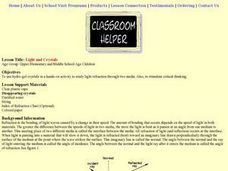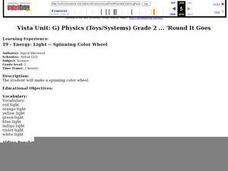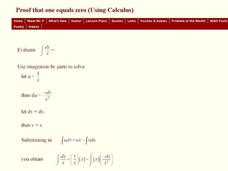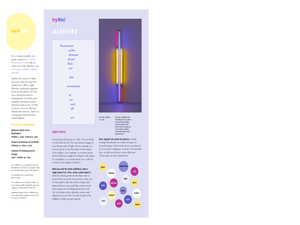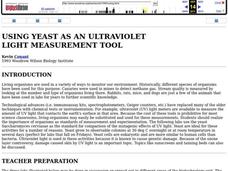Howard Hughes Medical Institute
Understanding Variation
Does where we live influence how our bodies express genetic traits? Explore variation in human skin color with an activity that incorporate video and hands-on learning. Individuals model the relationship between phenotypes and genotypes,...
Howard Hughes Medical Institute
Zebrafish and Skin Color
You may not know if that zebrafish in your fish tank is a model citizen—but it is definitely a model organism! What can we learn about ourselves from a tiny zebrafish? Discover more about the polygenic trait of skin color through a...
Curated OER
Light and Crystals
Learners complete hands-on activities to observe light refraction. They observe and compare the refraction in different substances and then write about it.
Curated OER
Don't Burn, Baby, Burn!
Students consider products that provide protection from sunburn and other negative effects of the sun's ultraviolet rays. They develop or improve upon sun-screening products that are meant to provide protection for populations at risk...
Curated OER
Differential Thermal Calorimetry
Students access prior knowledge of infrared rays, ultraviolet rays, gamma rays, x-rays and cosmic waves. In this electromagnetic waves lesson, students hold a mock trial electromagnetic spectrum. Students present characteristics of the...
Curated OER
Biology: New Trials & Findings
Students use background knowledge to summarize articles about skin cancer research and present them to the class and place their studies along a clinical study timeline. They are introduced to clincal trails and to various aspects of...
Curated OER
Electromagnetic Waves
In this electromagnetic waves activity, learners review the different types of electromagnetic waves. Students also compare and contrast light and sound waves. This activity has 10 fill in the blank, 5 multiple choice, and 6 short answer...
Curated OER
Electromagnetic Spectrum Worksheet
These six multiple-choice questions ask pupils to evaluate the energy, wavelength, and frequency of particular electromagnetic wavelengths. Further questions then require them to apply their knowledge and convert certain values or give...
Teach Engineering
Quantum Dots and Colors
Introduce teams to quantum dot solutions with an activity that has them expose solutions to a blacklight, observe the colors, and take measurements. Groups graph the data and analyze the dependence between particle size and...
Nemours KidsHealth
Skin Cancer: Grades 6-8
Do we really need sunscreen? What are the risks of tanning? Learners explore these questions through a series of informational texts and engaging, hands-on activities.
Curated OER
Energy: Light -- Spinning Color Wheel
Second graders make spinning color wheels to determine how energy effects what colors look like. They paint or color a color wheel with the seven colors of the spectrum. Next, the spin the wheel to determine what happens. In order to...
Teach Engineering
Thirsty for Gold
In the last portion of the six-part unit, teams perform an experiment with gold nanoparticles to determine which sport drink has the most electrolytes. The nanoparticles are used as chemical sensors and fluoresce in different wavelengths...
University of Colorado
Using Spectral Data to Explore Saturn and Titan
Saturn is really far away, but knowledge of its composition is within reach. Future astronomers learn how scientists use spectra to remotely determine the chemical composition of a planet or moon. They try out this concept by analyzing...
Cornell University
Insect Anatomy
Young entomologists discover insect anatomy in a very detailed unit plan. Offering background information for teachers about various insects, class members explore the differences between bugs and insects—and yes, there are many...
National Nanotechnology Infrastructure Network
Hiding Behind the Mask
Microchips are a man-made wonder. Investigate the manufacturing wonder with a hands-on inquiry-based lesson. Scholars simulate the process of pattern transfer using photoresist. Their conclusion identifies how their process replicates...
College Board
2018 AP® Physics 2: Algebra-Based Free-Response Questions
While the AP Physics 2 test maintains the reputation for one of the most difficult AP exams, scholars feel better prepared after practicing free-response questions on currents, conservation of energy, and displacement. The College Board...
University of Colorado
Enceladus, I Barely Knew You
Use spectral knowledge to make discoveries on a distant moon. Small groups gather information from images of one of Saturn's moons. The moon orbits within the E-ring made up of mainly water ice. Using information about the composition of...
Curated OER
Biology: Sun, Skin and Cancer
Students identify basic components of skin on a cross sectional diagram. They provide a basic description of cancer in terms of cell biology. Students explore the ABCD of skin cancer/mole evaluation and perform their own evaluation of...
Curated OER
Proof That One Equals Zero (Using Calculus)
In this proofs activity, students evaluate the integral of 1 function. Students use uv-substitution to prove 0=1.
Curated OER
Electric Light Art
Learners write a poem about a single work of art by Flavin. In this descriptive response lesson, students express their feelings about the work and organize words into phrases. Learners arrange word phrases on paper to form...
Curated OER
The Color Spectrum: How Does it Work?
Create models of the infrared, visible, and ultraviolet portions of the electromagnetic spectrum. Working in small groups, your class can investigate metric conversions calculations. They will find the length of the waves in nanometers,...
Curated OER
Using Yeast as an Ultraviolet Light Measurement Tool
Students accurately measure the relationship between radiation dose and either survival or some genetic event such as mutation or recombination. They investigate the damage that was done to the DNA molecule as a result of exposure to...
Curated OER
Simulation of Irradiation
In this irradiation worksheet, students simulate the effects of irradiation on bacteria growth by using UV light. Then students complete 6 short answer questions.
National Nanotechnology Infrastructure Network
Small Scale Stenciling: Mask Lab
Investigate the procedure for developing computer chips! Learners use solar print paper to create both positive and negative images. They observe the effects of single and multiple exposures and compare results.
Other popular searches
- Uv Beads
- Uv Radiation Damage
- Uv Exposure
- Sun Uv Rays
- Uv Radiation Cancer
- Uv Detection Beads
- Science Uv Rays
- Uv Rays and Dna
- Radiation Sun Uv Rays
- Conjugation Uv
- Sun Safety Uv Beads
- Beers Law Uv


